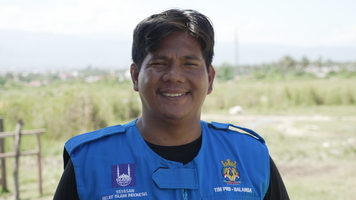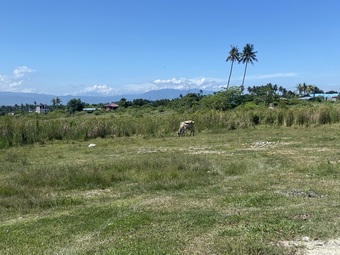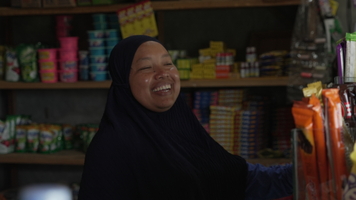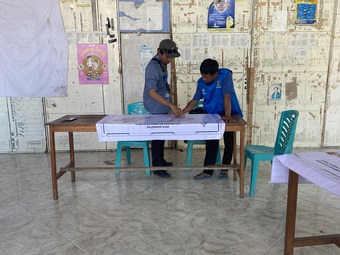Islamic Relief responds to emergencies around the world, assisting people in their most vulnerable moments. But another important part of our work is staying with affected communities and supporting them to rebuild their lives. Charlotte Mitchell, an editorial advisor at Islamic Relief, recently visited Indonesia’s Central Sulawesi region to see some of the long-term projects helping communities in the area.
Standing on the jagged edge of what had once been a bridge, the reality of the disaster I’d spent the last 6 days discussing finally began to register.
It was my final day in Palu, Indonesia, where I’d been visiting projects run by Islamic Relief and meeting some of the people we’d assisted since 2018, when the area was struck by a devastating earthquake and tsunami.
The only remnants of the formerly 250-metre-long bridge were its columns, rising out of the water to support nothing at all. One colleague mentioned, almost offhandedly, that an Islamic Relief volunteer had been on the bridge when the tsunami hit. He had only survived by clinging to its arches, which were now nowhere to be seen.
The volunteer, Lukman, was one of the first people I’d met in Palu. We spoke about the work he was doing with Islamic Relief to identify evacuation points for residents of nearby Balaroa village to use in the event of future disasters.
As I stood on the bridge, I struggled to connect the jovial, camera-shy man I’d met with such a horrifying experience.
But Lukman reminds me of a lot of people I met in Indonesia and, in some ways, of Palu itself, where the scars of what happened in 2018 aren’t always visible at first glance.

A devastating disaster
Islamic Relief has been working in Indonesia since 2000, but operations in Palu began in 2018 after the earthquake.
More than 4,000 people died, including hundreds who survived the initial disaster but were later caught up in related landslides, flash floods and soil liquefaction incidents.
I’d never heard of liquefaction before, but it is a phenomenon that people in the area know all too well.
Earthquakes can shake and loosen tightly-packed soil. In Palu, this, combined with huge amounts of water brought inland by the tsunami, saw homes, fields and people literally swallowed by the ground.


Some of the liquefaction sites I visited looked like disused fields, taken over by grazing cows, and it was difficult to imagine what had been there before.
At others, the shells of buildings poked out from the overgrowth and broken tiles that once decorated peoples’ homes still littered the ground. At one site, the silver dome of a mosque glinted in the sun, but the rest of the building was buried.
Palu is a vibrant city, buzzing with scooters carrying people to and from work, and roadside vendors selling every variety of fruit imaginable. For people like me, who’d never seen the city before 2018, it was hard to believe it had been so heavily damaged just a few years ago.
Resilience
I had the same feeling meeting people Islamic Relief had supported. Everywhere I went, I was greeted with smiles, warmth and jokes.
The mood was buoyant, even when discussing hardships people faced in their daily lives. Often, however, the tone shifted when we began to talk about the events of 2018.
People recalled how they had lost family members, as well as their homes. Many had to live in temporary housing for years, and still more were forced to figure out new ways of making a living as their farmland and machinery had been destroyed. Some women lost their husbands and fathers, and with them the entire family’s livelihood.
In the years since the disaster, these same people have shown incredible resilience.

With the help of Islamic Relief, many women have learned business skills, through projects such as one teaching women how to produce, advertise and sell honey.
Islamic Relief has helped to rebuild schools, giving children who spent years attending classes in sweltering tents a safe and comfortable place to learn.
We’ve brought water and sanitation to villages that lost their infrastructure in the disaster, and have rebuilt homes.
Rebuilding lives
Projects like these have helped to change lives and support individuals and communities on the road to becoming self-sufficient once more.
Among them is Susi, who set up a roadside kiosk with Islamic Relief’s help, stocking everything from shampoo and snacks to gasoline and gardening tools.
The business has become such a success that Susi no longer needs Islamic Relief’s assistance and supports her family with her income.

Long-term support
Emergency response is a key part of Islamic Relief’s work and a real lifeline to people in their moment of greatest need, but in a country like Indonesia, which suffers thousands of dramatic weather events each year, simply responding to these emergencies is not enough.
For Indonesians it is not a question of if another disaster will strike, only where and when.
Stories like Susi’s show how valuable long-term support can be to helping individuals and communities rebuild their lives after disaster.
Time and time again, people in Palu told me how, in the months and years following the disaster, international aid charities began to leave, but Islamic Relief remained.
We have been working, not only to help people rebuild their lives, but also to prepare for future disasters.

As climate change increases both the number and severity of extreme weather events, this work has become more important than ever.
In Palu, we have run disaster simulations to build the confidence and experience of local authorities in their emergency response. We are planting bamboo by riverbanks to create a barrier against flooding, and ensuring that local communities know what to do in the event of a disaster.
The work I saw is a testament to how essential long-term development projects such as these are to communities living in areas affected by extreme weather.
Earthquakes and tsunamis may hit global headlines for a couple of days before being largely forgotten, but affected communities take years to recover. What I saw in Palu was that, with the right help, communities and individuals can not only recover, but flourish.
Help us continue our vital work helping communities in Indonesia rebuild their lives and prepare for future disasters. Donate now.
BROWSE OTHER OPINIONS
FEATURED OPINIONS
- The science couldn’t be clearer: communities must lead climate adaptation action
- December in Gaza used to be filled with celebration, this year, there is only fear and sadness
- Eid Mubarak from Islamic Relief
- A Ramadan in mourning in Gaza
- Our loved ones, our culture, our homes and our safety – losses seared onto Palestinian hearts
MOST POPULAR TOPIC
View More










